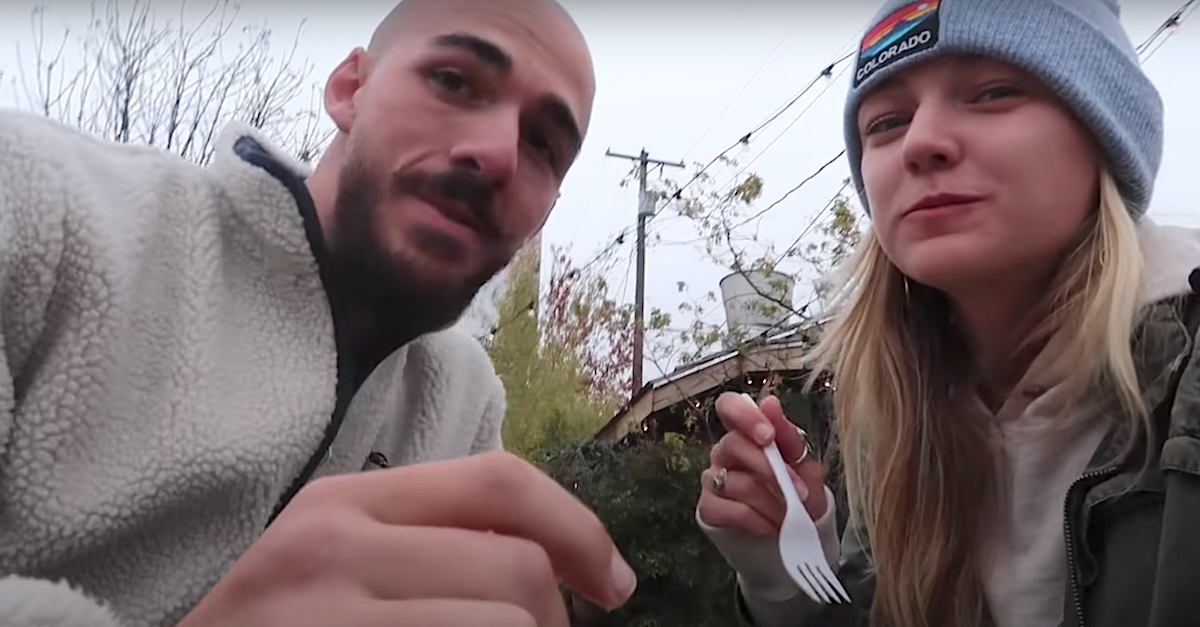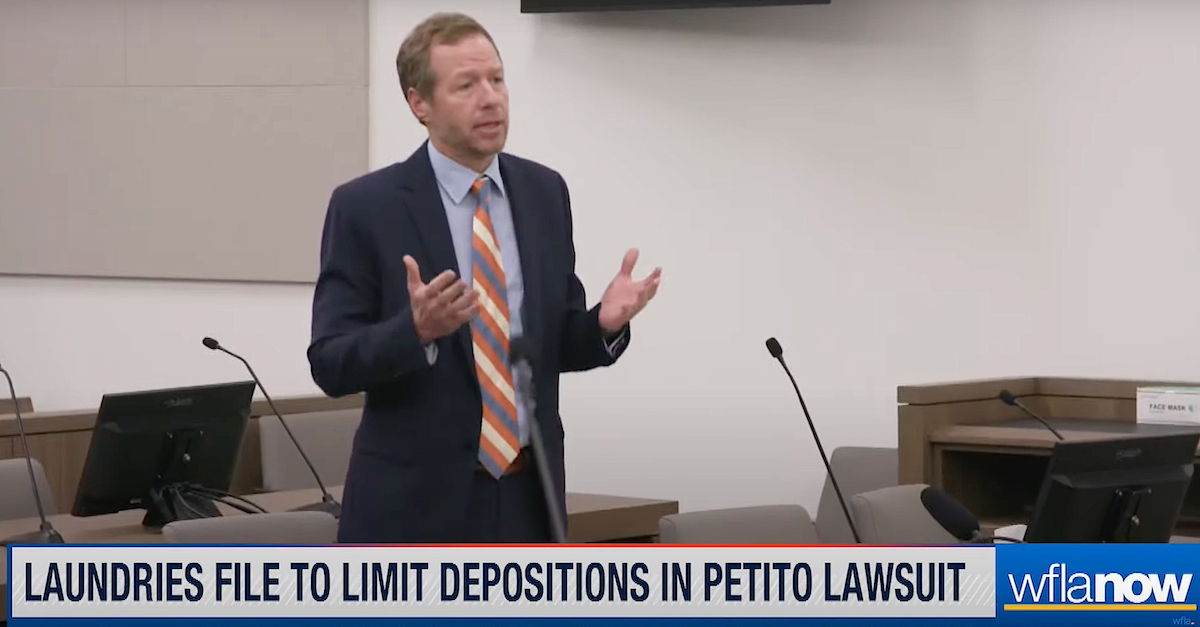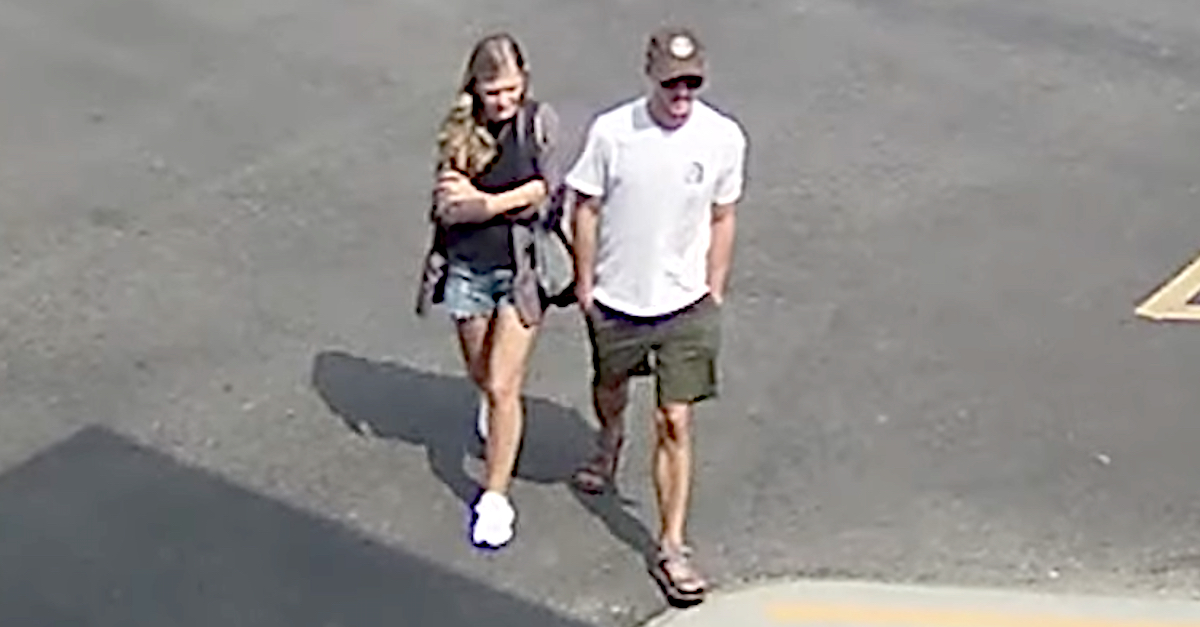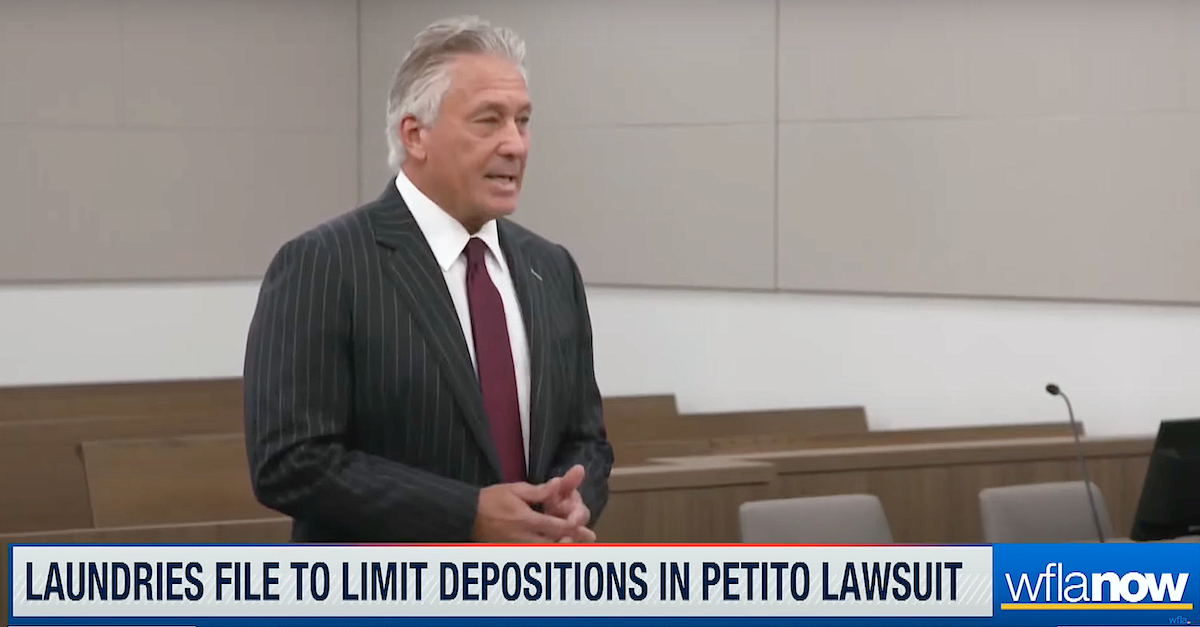
Brian Laundrie and Gabby Petito. (Image via screengrab from YouTube/Nomadic Statik.)
A Florida judge on Tuesday refused to limit questions that attorneys for Gabby Petito’s parents can ask the parents of Brian Laundrie in upcoming depositions.
“The Court notes that there really has been no showing of misconduct by the plaintiffs,” Judge Hunter W. Carroll said in reference to the Petito family while ruling on a motion for a protective order filed several weeks ago on Oct. 27, 2022.
Judge Carroll said he normally limits deposition topics only when something “other” than intense media scrutiny was occurring in a case.
“The proposed limitation is, in the court’s view, is overly narrow and would actually preclude directly relevant evidence gathering in this particular case under the allegations as alleged, and the court cannot find that there is a showing of good cause,” the judge said.
After losing his argument, P. Matthew Luka, an attorney for the Laundrie family, then asked whether a special master could supervise his client’s upcoming depositions. The judge said both attorneys had exhibited high degrees of professionalism, knew how to get along, and that the presence of “the media” was not grounds to grant that request.
“I trust both of you,” the judge said.

Gabby Petito and Brian Laundrie appear in Aug. 12, 2021 Moab, Utah police body camera videos. Laundrie’s notebook, which was found near his body and which contained a confession, was released on June 24, 2022.
The depositions are part of a lawsuit filed by Joseph Petito and Nichole Schmidt against Christopher Laundrie and Roberta Laundrie. Gabby’s parents have alleged that the Laundries intentionally inflicted emotional distress by issuing a Sept. 14, 2021 statement while their daughter was missing.
“It is our understanding that a search has been organized for Miss Petito in or near Grand Teton National Park in Wyoming,” the Laundrie family said in a statement released though an attorney. “On behalf of the Laundrie family it is our hope that the search for Miss Petito is successful and that Miss Petito is reunited with her family.”
The Petitos have alleged that the Laundries knew as early as Aug. 28, 2021, that their son had killed Gabby and that the Laundries issued the foregoing statement and created a false sense that Gabby was alive.
During the hearing, Luka reiterated complaints that his clients’ depositions would likely be spread far and wide by the press.

Attorney Matt Luka is representing the Laundrie family in a civil lawsuit that alleges emotional distress. (Image via WFLA-TV/YouTube.)
“We want to limit the scope of those depositions,” Luka said, to “focus” them on “the relevant period of time identified in the amended complaint” — that is, on the statement mentioned above.
Luka said he realized that the “intent of that statement, the knowledge of the Laundries during the period of time of that statement, and any actions they took during that time, of course, subject to the attorney-client privilege or any applicable privileges” would be fair game.
Specifically, Luka said anything prior to Aug. 27, 2021, would not be relevant to the instant case. He explicitly asked the court to ban questions that would “meticulously scrutinize their entire relationship up until the point where this event occurred.”
“It’s simply not relevant to the cause of action,” Luka claimed. “Whether or not they had a good relationship, a bad relationship, whether or not they spoke ten times or one time, is really, frankly, of no moment in terms of whether or not that statement made by their attorney in context as it was made at the time of those facts — that’s really what this cause of action is about — not whether or not they had a good relationship or a bad relationship leading up to that point.”
Luka said Petito’s attorneys could inquire as to the status of the relationship at the time of the Sept. 14 statement but that everything else should be precluded.

Gabby Petito and Brian Laundrie are seen entering a Whole Foods grocery store in Wyoming on Aug. 27, 2021. Surveillance recordings from the store are believed to be the last of Gabby Petito alive.
Luka also said events which occurred after Gabby’s body was discovered should also have been off-limits. For instance, he said it was irrelevant whether or not the Laundries ever saw Brian and Gabby argued, whether or not Gabby lived with the Laundries and what their relationship was like then, or “how many times the Laundries spoke with the plaintiffs really make no difference in ultimately proving their case.”
Luka suggested that delving into the aforementioned topics would be “burdensome, oppressive, annoying, or harassing” to his clients.
“Both families have been through a horrific experience,” Luka continued. “Just speaking for the Laundries, they had to experience their son doing something terrible, and then he killed himself. Living through that nightmare obviously created a lot of emotional trauma at the time, and they still carry a lot of emotional baggage as a result.”
He then said the “intense media scrutiny” led to the Petito murder being “the biggest news story of 2021” — a dubious claim. The most-read news story of 2021 was the breach of the U.S. Capitol Complex on Jan. 6, 2021, and the installation of Joe Biden as president. The Petito murder came in lower on CNN’s list of top stories and didn’t even place on a CBS News list.
Judge Carroll interjected that usually protective orders were issued in cases where a deponent had a “medical condition.” Luka said that wasn’t an issue here.
The defense attorney then returned to concerns that the Laundries’ depositions would likely be obtained by the media. Judge Carroll said public depositions are the rule in Florida law and that this case should be no different.
Luka said “a lot of vitrol online” would “subject [the Laundries’ to unnecessary scrutiny, harassment,” and “media attention.”

Attorney Pat Reilly is representing Gabby Petito’s parents. (Image via WFLA-TV/YouTube.)
Patrick J. Reilly, an attorney for the Petitos, responded that a “prior restraint” on the deposition was not proper.
“The case is not about the emotional distress the Laundries suffered,” Reilly said. “Far from it. This is about the emotional distress that my clients suffered as a result of their conduct and their statement.”
Reilly said the Laundries “invite[d]” coverage by issuing statements through their attorney Steve Bertolino.
Judge Carroll suggested that he probably shouldn’t consider the media attention on the case; Reilly agreed.
“I don’t think the fact that these questions are difficult for them and might embarrass them and cause them distress matters,” Reilly continued. “That’s what litigation’s all about. It happens. Parties come into court when they’re adversarial. Parties file cases against one another in difficult situations where there’s animosity, where there’s emotion. This case is no different in that regard than any other case.”
Reilly added that the “usual” questions that are part of a deposition, including the defendants’ dates of birth and address, would be off limits under the defense request. He said the defense’s proposed 20-day or 24-day window for questions was unreasonable.
Reilly said the defendants failed to meet the “good cause” burden necessary to obtain a protective order. As noted above, the judge agreed.